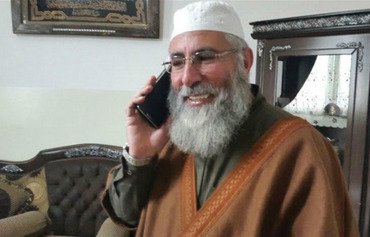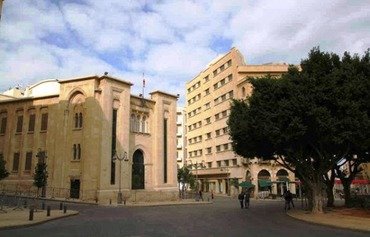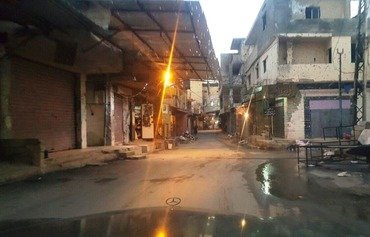Within the scope of his duties, Lebanese general security chief Maj. Gen. Abbas Ibrahim works to find solutions to problems that arise between local parties amid the paralysis brought on by the current political vacuum.
In an exclusive interview with Al-Mashareq, Ibrahim, who heads Lebanon's General Security Directorate, highlighted the impact of Syria's war on Lebanon and called on Lebanese parties to recognise the importance of reconciliation.
Al-Mashareq: Terrorism has been threatening Lebanon for years, and takes different forms. What is the directorate's role in confronting and combating it?
Abbas Ibrahim: Lebanon was one of the first countries to be threatened by terrorism, which targeted its state agencies and national fabric, starting with the storming of the Justice Palace in Sidon and assassination of four judges in the 1990s. Takfiri terrorism that targets the values of the civilised and free world, began with al-Diniyyeh and Nahr al-Bared refugee camp events in 2007 and went on to include attacks on the security forces in blatant violations of Lebanon’s borders, sovereignty and territory by two terror groups, the "Islamic State of Iraq and the Levant" (ISIL) and Fatah al-Sham Front, formerly known as al-Nusra Front (ANF), in the Arsal region near the eastern border with Syria.
Successes have been achieved based on a proactive security plan we have put in place, in accordance with the rules and legal texts in force, and we have reached a stage of robust security in which all arrest orders are issued by a specialised court.
Al-Mashareq: There is more than one security agency in Lebanon involved in combating terrorism and terrorist groups. How does the directorate carry out its role without conflict or overlap with the work of other agencies?
Ibrahim: All security and military agencies are engaged in a battle for Lebanon and its right to defend its sovereignty, democracy and cultural and spiritual diversity in the face of takfiri terrorism that wants to topple the modern civil state.
In this battle, all agencies combine their efforts in a singularly precise and professional manner, evidenced by the fact that they have spared Lebanon from the tragedies and terrorist bombings that have inflamed the entire region and reached Europe and the US.
Al-Mashareq: The directorate's tasks include controlling border crossings. Can it be said they are tightly controlled?
Ibrahim: Tight control is an apt description that applies to the well-known legitimate international border crossings. However, there remains the problem of the illegal crossings and routes, which has been an issue since before the establishment of Syria and Lebanon, with their current borders, and always has been at the root of the flow of weapons and smuggling of contraband between the two sides.
These [illegal] crossings are 278 kilometres long and controlling them requires that they be demarcated and that there be co-operation between the two countries.
Al-Mashareq: What are the threats posed by the presence of groups such as ISIL at the Lebanese border?
Ibrahim: The presence of terrorist groups such as Fatah al-Sham, or ANF, and ISIL poses a major threat to Lebanon both externally and internally as both groups target Lebanon. Their conspicuous presence on the border, as well as their presence in the interior as sleeper cells, put the country under a double-edged threat: direct military confrontation, and indirect security confrontation. Neither of these groups, by virtue of their ideological and doctrinal orientation, recognise state borders.
Lebanon is distinguished for the co-existence among its various cultural and spiritual components, and our country is by its nature a cultural, civilisational and ideological opposite to the mentality that drives these groups.
These two groups have launched suicide bombings and armed attacks that stretched from the border deep into the Lebanese interior, killing dozens and wounding hundreds, not to mention the dozens of terrorist attacks that have been thwarted and terrorist cells that have been dismantled.
So, their presence at our border with Syria, and at times on Lebanese territory in the person of suicide bombers, keeps security institutions in a state of constant alert and readiness.
Al-Mashareq: To what extent does Hizbullah's involvement in the Syrian war drive terrorist groups to retaliate against it in Lebanon?
Ibrahim: This point of view is on the table for political discussion and debate in Lebanon. Hizbullah’s venture into Syria, and before that the venture of Lebanese into the Syrian interior, is a serious problem with consequences that are obvious to everyone and not a secret to anyone.
It is one of the causes of the Syrian war, which we hope will end quickly, and with it all the consequences and negative repercussions on Lebanon stemming from it, starting with the political divide on the issue of Syrian refugees that has had a negative repercussion on the country on all levels: economic, social, security and environmental. This is a predicament that Lebanon cannot escape, except through the solidarity of all the Lebanese and help of the international community, which has not found a practical solution to this crisis.
Al-Mashareq: What is the magnitude of the threat emanating from Ain al-Hilweh camp, which is home to wanted terrorists ?
Ibrahim: The magnitude of the threat to Ain al-Hilweh is more serious than the threat emanating from it, because terrorists have turned it into a refuge for wanted persons and fugitives from justice, and have spawned misplaced hatred towards all Palestinian refugees.
However, mechanisms recently have been developed for co-operation between the Lebanese authorities and Palestinian factions in the camp that entails the handover of all fugitives and wanted persons, regardless of the charges against them, to safeguard the security of Palestinians, which is part of the security of all Lebanese. So far, the Palestinian factions in the camp have co-operated closely and quickly with the demands of the legitimate Lebanese authorities.
Al-Mashareq: How can security agencies be successful in maintaining security in the country amid the political tension and economic pressures?
Ibrahim: In view of the circumstances in Lebanon and the threats looming over it, the tasks of security agencies include obtaining intelligence pertaining to all aspects related to the cohesion and peace of the state, and analysing and assessing the threats associated with them, then submitting them to the constitutional authorities to decide on them and provide political cover for field and logistical work.
For their part, the military, security and intelligence agencies act based on judicial input and legal evidence, and in this way, the agencies are completely insulated from all political disputes and divisions.

![In a wide-ranging interview with Al-Mashareq, Lebanese security chief Maj. Gen. Abbas Ibrahim described the country's proactive plan to enhance national security. [Photo courtesy of the General Security Directorate]](/cnmi_am/images/2016/10/12/6334-Lebanon-abbas-ibrahim-600_384.jpg)







In reality, the security situation in Lebanon and Syria cannot be separated. Lebanon, in one way or another, has been involved in the political conflict through the intervention of Hezbollah in the Syrian conflict. This is one the one hand, and on the other hand, the geographical nature of the two countries is somewhat the same. In fact, Lebanon is going through the crisis of bribe which the terrorists are paying to the people who are smuggling them from and into Lebanon. This is dangerous to the security reality. On the other hand, Lebanon has been generous to Syrians coming into the country, and has never let them down. However, Lebanon is now closing its doors to Syrians living in Lebanon, by tightening the noose on them. It’s not Lebanon which should be letting down the Syrian civilians who are forcibly displaced. Whoever talks about the liberation of Syrian land and the need for the Syrian people to return to their land, the issue of liberation is only a media topic. The fiery coverage from several pivots on an area that was a city in the past is in itself a greater danger than its non-liberation. The Lebanese government must pressure the Syrian state to secure the needs of the Syrian people and relieve Lebanon of the material damages. Protecting the border is the responsibility of the Syrian state. Lebanon today is the most secure area in the Middle East and the world. Therefore, we hope that the Lebanese government will not pressure Syrian newcomers because the
Reply1 Comment(s)